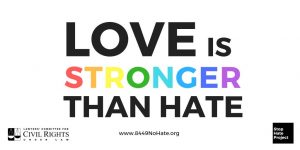The James Byrd Jr. Center to Stop Hate
Issues & Campaigns

![]()
 Hate incidents across the United States are surging, devastating individuals and entire communities. Hundreds of organizations in communities across the country work to combat hate every day. To help combat this increase and support those organizations, the Lawyers’ Committee for Civil Rights Under Law launched the James Byrd Jr. Center to Stop Hate.
Hate incidents across the United States are surging, devastating individuals and entire communities. Hundreds of organizations in communities across the country work to combat hate every day. To help combat this increase and support those organizations, the Lawyers’ Committee for Civil Rights Under Law launched the James Byrd Jr. Center to Stop Hate.
The James Byrd Jr. Center to Stop Hate supports communities and individuals targeted for hate and challenges white supremacy by using creative legal advocacy, disrupting systems that enable hate, and educating the general public and policy makers.
Litigation
Case: Metropolitan African Methodist Episcopal Church v. Proud Boys International, LLC
On Jan. 4, 2021, the Lawyers’ Committee for Civil Rights Under Law filed a lawsuit against the Proud Boys, a violent all-male group with ties to white nationalism, and their leader, Enrique Tarrio, for vandalizing the Metropolitan African Methodist Episcopal Church. The Proud Boys attacked and vandalized property of the Metropolitan African Methodist Episcopal Church, a historic Black church, because of its congregants’ support for the Black Lives Matter movement. The Church was terrorized through coordinated acts of violence when Proud Boys members climbed over a fence surrounding the Church, came on to the Church’s property and destroyed a large Black Lives Matter sign the Church was proudly displaying—attempting to silence the Church’s support for the racial justice movement with violent acts of trespass, theft, and destruction of property.Throughout the summer and fall of 2020, members of the Proud Boys promoted and participated in violent events. The Proud Boys are not above the law, and will be held accountable for their racialized terror.
Read the lawsuit here.
Read the press release here.
Read the motion for default judgment here.
Read the expert report in support of plaintiff’s motion for default judgment here.
Policy & Advocacy
Matthew Shepard and James Byrd Hate Crimes Prevention Act:
In 2010, President Barack Obama signed the Matthew Shepard and James Byrd Hate Crimes Prevention Act. The milestone hate crime law increased the jurisdiction of the FBI and Department of Justice to investigate bias-motivated violence targeting vulnerable individuals, and expanded federal hate-crime law to include crimes motivated by a victim’s actual or perceived gender, sex ual orientation, gender identity, or disability. It was named in honor of two individuals killed in hateful violence in 1998: James Byrd Jr., a Black man in Jasper, Texas, and Matthew Shepard, a young gay man in Wyoming.
Report: Hate In Elections: How Racism and Bigotry Threaten Election Integrity in the United States
On Sept. 16, 2019, the James Byrd Jr. Center to Stop Hate released Hate in Elections: How Racism and Bigotry Threaten Election Integrity in the United States, a comprehensive overview of how hate crimes and hate incidents can impact the election process. By examining disturbances in the recent elections, the report highlights how hate and bigotry are utilized by those seeking to intimidate, dissuade or harass candidates of color and voters from historically marginalized groups. The report also provides an overview of relevant legal frameworks and resources for individuals and candidates who have experienced election-related bigotry.
Key takeaways from Hate in Elections:
- When hate crimes or hate incidents occur during elections, they can send a message that it is dangerous to vote and deter members of historically marginalized groups from participating in the democratic process.
- There is evidence of poll workers all over the country requesting additional identification or creating more stringent check-in procedures for voters of color, as well as harassing voters who are not proficient in English and making it difficult for them to get the language assistance they require.
- There has been an increase of hateful activities organized by white supremacist groups, from rallies to promote conservative issues and candidates, to widespread misinformation regarding polling locations and candidates—and even racist, phony robocalls.
- Social media platforms such as Facebook, Twitter, and YouTube are the primary vehicles for disseminating online election-related hate. There is a well-documented history of users threatening voters, doxing election officials and representatives and sharing fake government posts.
- Candidates for office and political parties have used implicit or explicit appeals to racism, Islamophobia, and xenophobia in online campaign advertisements, especially on YouTube, Facebook, Twitter, or other social media platforms where they could reach a broad audience and have the opportunity to go viral with minimal expenditures.
#EndWhiteNationalism


